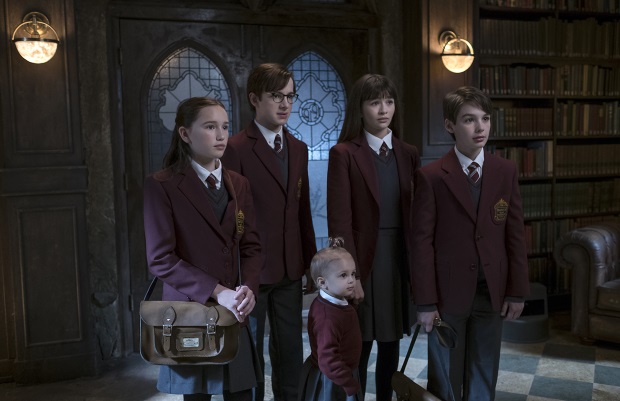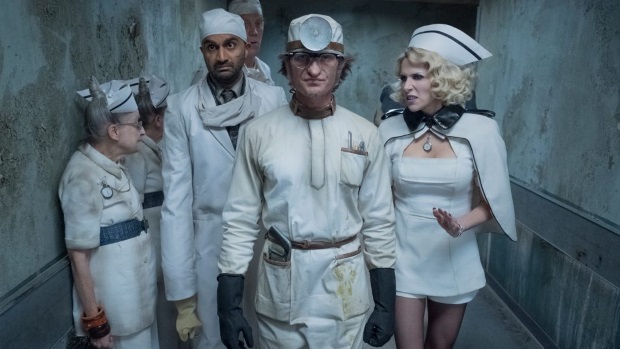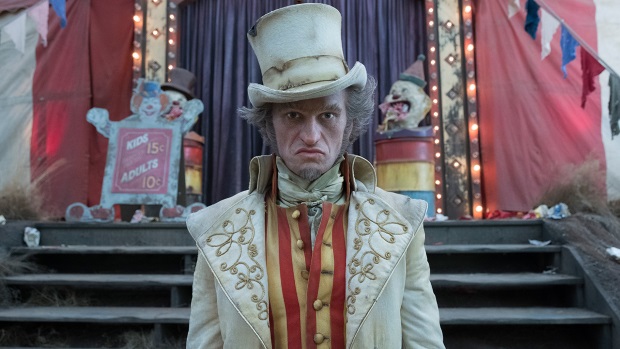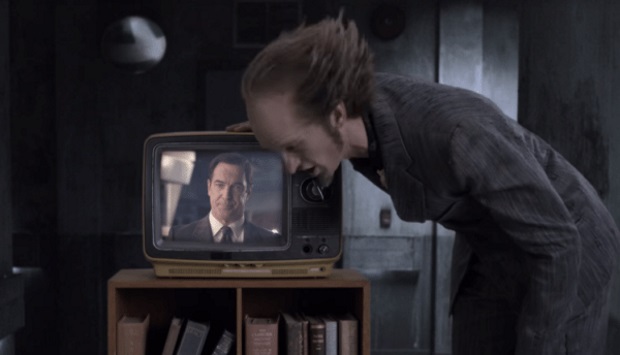A Series Of Unfortunate Events: Season 2 spoiler free review
Oblique, layered and outright odd, there's really nothing else quite like A Series Of Unfortunate Events on television...
Last year’s first season of A Series Of Unfortunate Events was an absolute gift to fans of the books; faithful, albeit with tweaks that added more to the dense mythology of the series. While not without flaws, many carried over from the book series itself, the first season was dark, inventive and frequently very funny. It obviously struck a chord outside of the fandom as well; swiftly being renewed for two more seasons that were filmed back to back. Season two hits the ground running, picking up where last year’s eight episode run ended and covering books five through nine: The Austere Academy, The Ersatz Elevator, The Vile Village, The Hostile Hospital and The Carnivorous Carnival. It largely continues the ethos of its predecessor; closely following most of the events of the books, with a few changes here and there to make the serialisation a little smoother and the overall mystery more pronounced. And for the most part, it works a treat.
Season two picks up with the Baudelaire orphans at boarding school, under the predictably useless watch of the inept and cruel Vice Principal Nero. In due course, the villainous Count Olaf arrives with a new host of absurd disguises that only the Baudelaires and their new friends, the equally unlucky Quagmire triplets, seem able to see through.
The first four books in the series largely followed the same basic plot; and while the general structure didn’t change too much until the eighth book, the series benefitted enormously from the introduction of an overarching conspiracy in the fifth, a conspiracy that immediately made the books feel less repetitive and more like they had a clear narrative drive. Season one of the show brought these elements in earlier, but season two still benefits from the fact that it can get into a more dynamic stretch of the story, one in which the mysteries build, the stakes rise and the well-trodden structure is turned on its head.
It’s no spoiler, at least not if you’ve read the books, to say that season two features arguably the biggest game changer in the entirety of A Series Of Unfortunate Events, one that immediately makes the pace faster and the more frustrating elements of the show less irksome. It also, incidentally, makes the show feel more like an unfolding television series than an occasionally lurching collection of films split into two parts.

That aspect of Unfortunate Events does remain, however, especially in the first four episodes of the new season. There are times when devoting two hour long episodes to every slim volume does not work in the show’s favour, leading to protracted scenes and attempts at humour that fall flat, or at least come dangerously close to the territory of Jim Carrey’s Count Olaf performance from the 2004 film. It’s enough to make you wonder if the series would have been better served delivering either shorter episodes (a common Netflix complaint) or even one ninety-minute episode for every book. As it stands, often the stories are padded with new subplots; some of which are successful, others superfluous.
The early introduction of Nathan Fillion as Jacques Snicket, brother of narrator Lemony, is one of the more effective choices. In the books the character only appeared for one tiny, albeit crucial moment; here the character is a major player in the lead up to said moment, and gets to share several scenes with Count Olaf, illustrating an intriguing history between the two and shining a light on the more morally ambiguous aspects of the Count’s character (they exist). Plus, for fans of Dr Horrible’s Singalong Blog, any chance for Neil Patrick Harris and Nathan Fillion to bounce off each other is one worth taking.
The problem here is that Jacques, and the early introduction of another player from the books who works with him in the lead up to her own source material designated moment, makes returning players like VFD agents Jacqueline and Larry feel wholly redundant, essentially playing the same role as Jacques to less entertaining affect. Having several separate sets of noble agents vying to help the Baudelaires creates a sense of clutter and often makes the Baudelaires feel like supporting characters in their own story.
This, unfortunately, is a pitfall of being a more-or-less faithful adaptation with new subplots threaded throughout; the Baudelaires, to whose perspective the books were limited, must play out their pre-ordained plot, as learning major secrets at different places to the books would compromise their motivations. As such, the audience is well ahead of the protagonists and it can be frustrating when the Baudelaires meet a mysterious player and wonder aloud as to their identity and agenda, while we’ve been following said character for several episodes. And because the Baudelaires’ arcs remain the same as the books, fans may well find the new material more interesting and illuminating, occasionally meaning that the story of the Baudelaires becomes the least interesting part of the show.

Elsewhere, the show feels like it’s having more fun with the genres suggested by each new setting, with the Vile Village episodes playing like a classic western, The Ersatz Elevator a glossy but biting social satire and The Hostile Hospital a horror movie. This helps differentiate every arc and keeps the series feeling fresh and engaging even as the beats get predictable.
The performances also remain uniformly excellent; Malina Weissman and Louis Hynes maintain the Baudelaires’ likeability, while new guest stars like Tony Hale are predictably great. The show is almost completely stolen by two new additions; Kitana Turnbull as the loathsome, shrill and occasionally musical Carmelita Spats, who provides one of the show’s biggest and most absurd laughs in episode two, and Lucy Punch as Olaf’s fashion obsessed girlfriend Esme Squalor, who brings one of the books’ most delightfully evil villains to highly entertaining life. The show lights up whenever either is onscreen.
Meanwhile, Neil Patrick Harris remains excellent as Olaf and is clearly having the time of his life, but the character seems to have lost some of his menace this time around. One of the best things about the first season was the way in which Olaf’s buffoonery was juxtaposed with moments that were legitimately dangerous and skin crawling. That’s not so much the case this time around; even one of Olaf’s most deplorable acts feels more like a punchline than the dreadful crime of the books. This is less Harris’ fault than that of the writers; across the board the series seems to have lost some of its teeth when it comes to depicting the darker elements. Characters whose deaths in the books kept the stakes high get reprieves here and it’s hard to know why, as none are characters the show especially benefits from keeping around. At worst, it makes the danger feel less dangerous, which is not a good thing for a series that is literally about terrible things happening despite our best efforts.

Part of this is also due to the depiction of Olaf’s troupe; in the books, like their boss, these characters walk a fine line between being silly and scary. In the show they’re just silly; there’s no menace whatsoever to the Hook Handed Man or the White Faced Women, and don’t get me started on the Henchperson of Indeterminate Gender. They exist to crack jokes, and the jokes are rarely very funny. As such, it can be eye-roll inducing when we reach the moments where some of these characters met their ends in the books and that doesn’t happen. It feels like the show is weirdly in love with these characters and sure, the actors are all doing great jobs, but the scripting of them leaves a lot to be desired. There’s also a baffling tendency to include Mr Poe (still wonderfully played by K. Todd Freeman) in scenes he was not present for in the books. This is problematic on a couple of levels; one, his absence in the later books was kind of the point, and two, it makes him party to happenings that turn his character from useless to actively malevolent.
Lest it seem like I’m bemoaning too much the fact that the series isn’t identical to the books, most of the changes work for the better. The two are different mediums and what works in one isn’t always going to work in the other; the problem comes about when a change actively harms the series and there’s no clear reason for it having been made. If it sounds like I’m being hard on the show then let me stipulate, season two hits far more than it misses and the shortcomings only stand out because of how much it gets right. It’s frequently laugh out loud hilarious, it features moments of inspired lunacy and touching melancholy and the production design is never less than beautiful, with every new location making you wish you could crawl through the screen and explore. It’s also absolutely packed with easter eggs that will make long time Snicket fans squeal in delight, from overt references to prequel series All The Wrong Questions (please adapt that next) to flashbacks that allow us to see fan favourites and deceased characters interacting with each other. And all the big mysteries, from the true nature of VFD to the Sugar Bowl, remain gloriously intact; the show even provides a handful of new clues that will equally thrill and frustrate.

It’s hard to know how this series comes across to anyone unfamiliar with the books; as a huge fan I often feel like I’m more inclined to forgive some of the more egregious shortcomings, such as the repetitiveness or perpetual incompetence of the adult characters. After all, if you know the books those things are almost part of the charm. If not, they might run the risk of derailing the show for you. But personally, I feel like there’s more than enough here to engage and entertain anyone, and it would be a sorry person who could begrudge the existence of a series this oblique, layered and outright odd. Or the fact that Netflix has clearly thrown a huge amount of money at what was clearly a gamble.
There really is nothing else like A Series Of Unfortunate Events on television, and that feels very fortunate indeed.
Season 2 of A Series Of Unfortunate Events is on Netflix from March 30th.